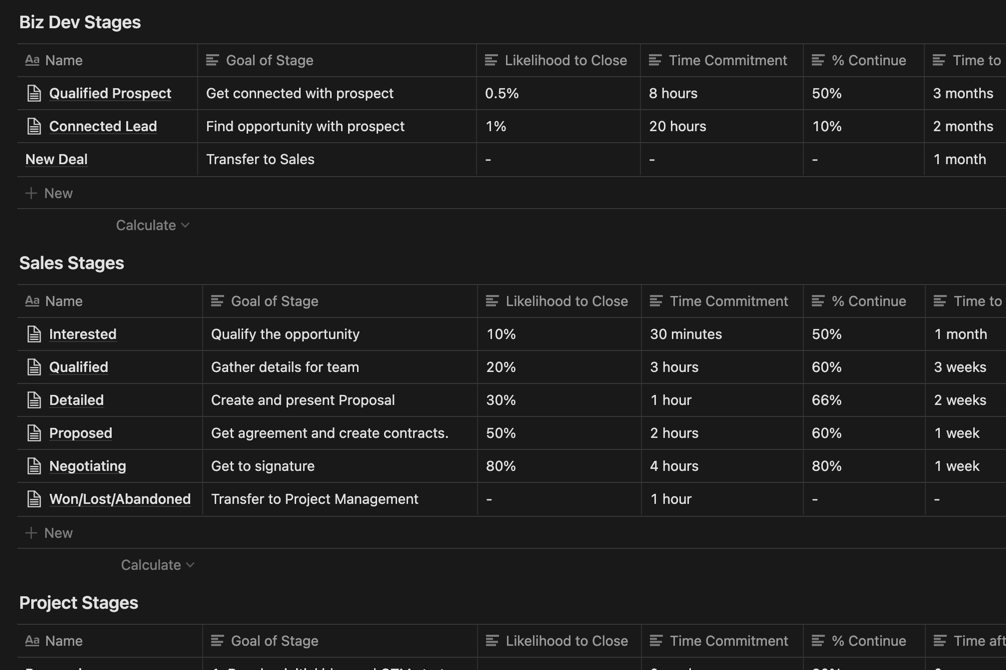For first-time founders without a sales background, starting a sales engine is one of the most daunting tasks. While figuring out product-market fit, your go-to-market strategy and funnel is an important component of finding and converting the right customers.
At Vaporware, we use a template for each stage of the sales process to help founders fractionally or full-time run a sales process, tweak it, and help bring in an early sales team. With this documentation it's much easier to find repeatable sales, determine what's not working, and improve momentum.
Start by understanding your buyer's complete journey, from when they first realized they had a problem. Are you using an outreach, ad-driven, inbound, or bottom-up approach? Document the marketing steps across Awareness, Consideration, and Decision stages to their journey. Note that these are customer-centric stages focused on their problem, potential solutions, and then your unique solution. Here's where your sales process starts.
Once a lead reaches signals they're a deal (or SQL), this is where the Sales Funnel and CRM (we love Pipedrive) come in. For each step of your sales funnel (or stage of the process), document out the following details in a standard format for each stage.

I personally like to keep this documented in Notion, or some other team wiki software, so that it can be a living document, referenced before every call, and adjusted collaboratively with a team.
- Stage Name. A short term that tells your team where the deal is in the process.
- Team. Who on your team, or what team in a larger org, owns this step of the process. Helps when there’s handoff between steps. (Name)
- Goal. What is the goal of the stage? (Short 3-5 words). Example: "Qualify the deal"
- Stage Entrance Criteria. What is required for a deal to enter this stage. (One clear sentence). Eg: “If a customer asks for a meeting, or agreed to meeting, usually when they want to talk about their specific problem.”
- Stage Responsibilities. What are the things our team is responsible for during this phase. A bullet list of tasks to be done. “Get team buy in, qualify them, …”
- Details. A script to walk through on calls or forms to fill out internally. Helps scaling / knowledge transfer. Should be an entire playbook and contain more than needed, so it can be tailored on each call. I typically copy this script into an Activity notes field in the CRM to keep me in one system during the call and write individual notes.
- Needed to Move Forward. The exit criteria. What are the questions you need to answer to move a deal to the next stage. Eg: “Do they have buying power, are they ready to invest in an idea right now”
- Customer Verifiable Outcome. What a customer needs to do in order to move to the next step. Usually they’ve agreed verbally to another meeting or to continue discussions. Meeting is scheduled on the calendar. You'll be kicking yourself and fretting if you don't have this understanding after you leave a call or meeting.
You'll also want to set goals around some basic metrics, and tweak them as you learn and adjust your funnel. Most CRMs will track these automatically and give you reports to adjust:
- % Continue. What is the conversion rate of this stage? (A % that is used to identify issues per stage quickly)
- Likelihood to Close. What is the total conversion rate for all companies that reach this stage? (Helps forecasting)
- Time Commitment. How much time on your team’s end does this stage take in man hours? (Helps identify issues quickly)
- Time to close. How much calendar time is remaining for deals in this stage to become booked revenue/close. (Helps forecasting)
You'll then want to document the onboarding process or upsell process to make sure they get to "Aha", success, and value as quickly as possible. The customer journey has just begun.
For a more holistic look at founding sales, I suggest the book from Pete Kazanjy and Holloway.



